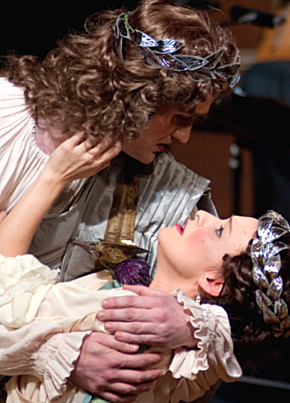As a previously un-opera-ed student, attending my first opera was a bit like eating quinoa or acai berries for the first time; you wanted not to like it because it’s so pretentious, but it actually turns out to be pretty good. I approached Charpentier’s Orphée (a combination of two operas) without prior comparison and was pleasantly surprised by a true Gesamtkunstwerk.
Surrounded by an audience filled with grey hair and bald heads, I was taken in by extremely talented vocalists singing in beautiful layers of lyric and musical harmony about the joy and agony of love and the significance of mercy.

The Baroque style was accurately replicated with a limited set, on-stage orchestra of obscure stringed instruments, some frivolous choreography, and no costume changes, leaving the men in more long hair and tights than Shakespeare.
Although this opera was in my two favourite languages, French and indiscernible singing, I was relieved to see subtitle translations projected on a screen above to indicate main plot points. It would have been difficult otherwise to understand the complexities from the limited action on stage. Despite the actors’ apparent training in gestural classes, copious amounts of meaningless prancing distracted me from the lumbering plot until finally, just when I was wondering, “So, hang on, who’s getting married?” there was suddenly a snake bite, death of the bride, and a near suicide all within five minutes.
Act one took me abruptly between feeling deeply impacted by woeful cries against the “pitiless gods, [who] let her die!” to having plenty of time to wonder where they found someone who can play a six-foot-long guitar. After slow beginnings, the first act closes with excitement as the mournful Romeo-archetype is all too easily talked out of killing himself by only two lines of verse. But the disheartened groom wasn’t giving up that easily, so he descends to the underworld to plea for the return of his love.
The second act is an engaging and emotionally exaggerated supplication for the Prince of the Underworld’s mercy. “Restore her to life or shroud me in darkness,” Orphée begs, and the underworld is surprisingly sympathetic, but the fate of the lovers was unclear. It is debated if the surviving manuscript is complete or if a third act was intended. Instead, this opera based on original Greek myth ended in the same way it began, with excessive propaganda for Louis XIV of France.
As many good Gesamtkunstwerks and works of art will cause you to do, I left the theatre reflecting on love and mortality, but made sure to change out of my opera gown and into ripped jeans afterwards to reassure myself that I remained an authentically human heartbroken lover, the very kind that this opera sings of.
Orphée
8pm, Saturday, March 15
McPherson Playhouse
pov.bc.ca
